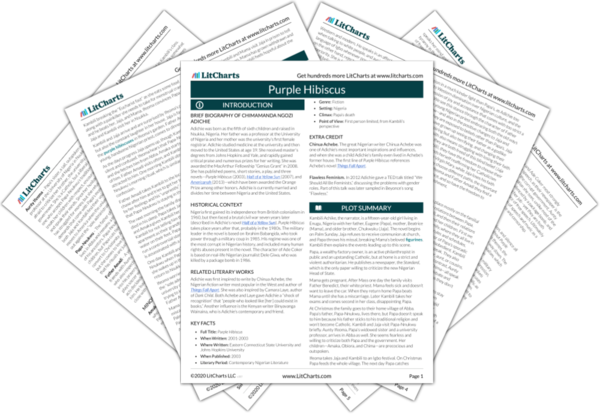Summary
Analysis
Kambili’s narration now jumps months back in time to describe the events leading up to Palm Sunday. Mama brings Kambili’s school uniforms inside before it rains. Jaja and Kambili wash their own uniforms in the half hour Papa allocates for uniform-washing. It isn’t proper for an older person to do a younger person’s chores, but Mama doesn’t mind bringing in the clothes. Kambili thinks about her mother that “there was so much that she did not mind.”
Adichie structures the novel so that we see the turning point for the family, then life up to that point, and then life after it. Kambili now explains daily life in the house before Jaja dared rebel against Papa. We start to see how Papa controls every aspect of his children’s’ lives, even scheduling their time for washing clothes. Kambili already has a hint of bitterness at her mother for submitting to violence so docilely.
Themes
Mama tells Kambili that she is pregnant, and the baby is due in October. Mama is pleased with this, because after having Kambili she had several miscarriages. The people of their home village started to gossip, and even to suggest that Papa should marry another woman who could have more children. But Papa stayed, and Mama is grateful he did. She compares him to another man who took a second wife. Kambili agrees that Papa should be praised for this. Kambili doesn’t even like comparing Papa to other men, as she considers him so far above them.
Everything seems peaceful at this point, and again we see the virtue of Papa’s public actions. Adichie also shows just how much Kambili idolizes her father at this point—she resents him even being compared to another man because she thinks he is so much better than other men. Papa is almost a godlike figure for her, and right now her belief in God is tied up in her belief in Papa.
Themes
Mama and Sisi are cooking to host the members of the Our Lady of the Miraculous Medal prayer group, which consists of some women in Enugu. During the event, the sisters clap and sing in Igbo for half an hour and then Sisi brings in the feast she and Mama have prepared. The sisters chide Mama for going to so much trouble, but then thank her and eat.
The Achikes are an important family with a spotless public image to uphold, and so Mama is obligated to entertain her guests well. The prayer group practices Catholicism in a way that Papa would not approve of, as we later learn—both singing and speaking Igbo.
Themes
Jaja comes home from school, wearing his neatly ironed uniform. Last year he was voted “neatest junior boy” at school, which pleased Papa greatly. Jaja goes to Kambili’s room and the two talk about Mama’s pregnancy. They speak in a kind of special language using mostly their eyes. Jaja declares that they must protect the baby, and Kambili knows that he means protect the baby from Papa.
Before Palm Sunday there is a special kind of silence in the house, a silence associated with fear and repression. Jaja and Kambili have a special language of glances, and they never speak directly of Papa’s violence. This is what Adichie means by “speaking with our spirits,” this section’s title.
Themes
Get the entire Purple Hibiscus LitChart as a printable PDF.

Jaja goes downstairs and Kambili looks at the written schedule posted on her wall. Papa makes a daily schedule for both Kambili and Jaja, allocating time for every activity, including studying, praying, eating, and “family time.” Kambili knows that “Papa liked order,” and she wonders when he will first start making a schedule for the new baby.
Papa’s tyranny over his family isn’t only violence—it also means that he controls every aspect of their lives, scheduling every activity every hour of Jaja and Kambili’s day.
Themes
During family time the next day, Papa and Jaja are playing chess and they are all listening to the radio. A general comes on the air and announces that there has been a coup, and that there will be a new government in Nigeria. Papa excuses himself and goes to call Ade Coker, the editor of Papa’s paper the Standard. Papa returns, looking, sad, and says that coups always lead to other coups, as “military men would always overthrow one another.”
The world of politics now intrudes into the family’s isolated sphere. We never get a detailed explanation, as everything is presented through Kambili’s eyes, but this coup and ensuing military regime is probably based on Ibrahim Babangida, one of Nigeria’s most corrupt rulers.
Themes
The Standard had been critical of the past government, running stories about cabinet members stashing public money in foreign bank accounts. Papa declares that though the politicians are corrupt, Nigeria needs a “renewed democracy” instead of a military leader. The next day the Standard is the only paper to criticize the new Head of State and ask him to return the government to a democracy. The other papers all praise the new leader for saving the country from the corrupt politicians. Kambili says “God will deliver us,” hoping to please Papa, and he takes her hand.
The great irony of Papa’s character is that though he is a violent and controlling tyrant at home, in public he bravely stands up for free speech and uses his wealth to help others. He and his editor, Ade Coker, become the only ones willing to criticize the corrupt regime that has just taken power, even when it means endangering their own lives. When she speaks, Kambili always thinks of what would please Papa best, not what she actually wants to say.
Themes












